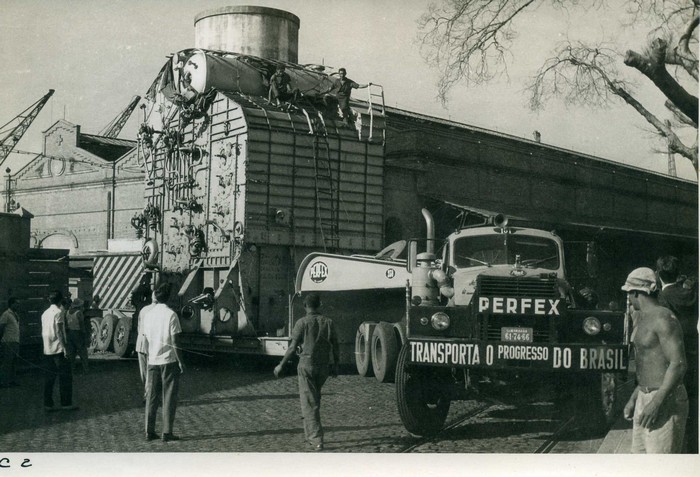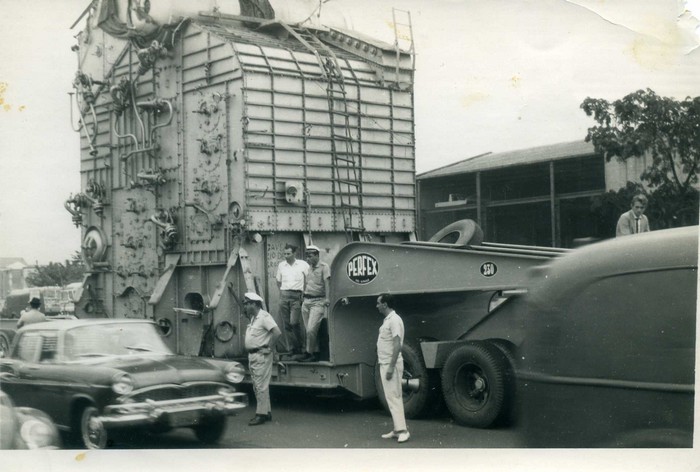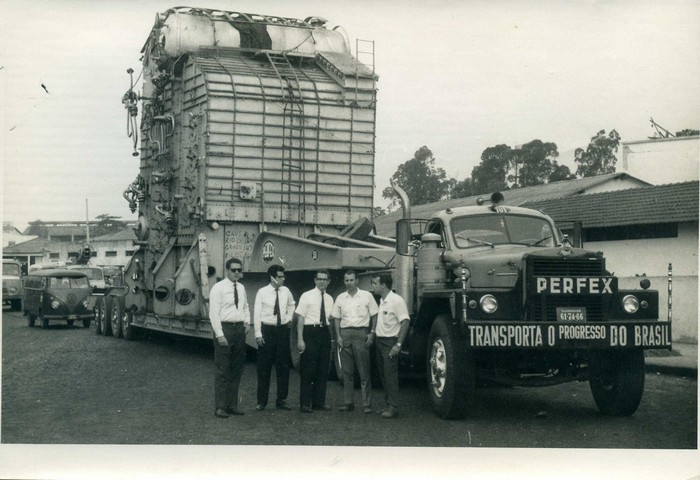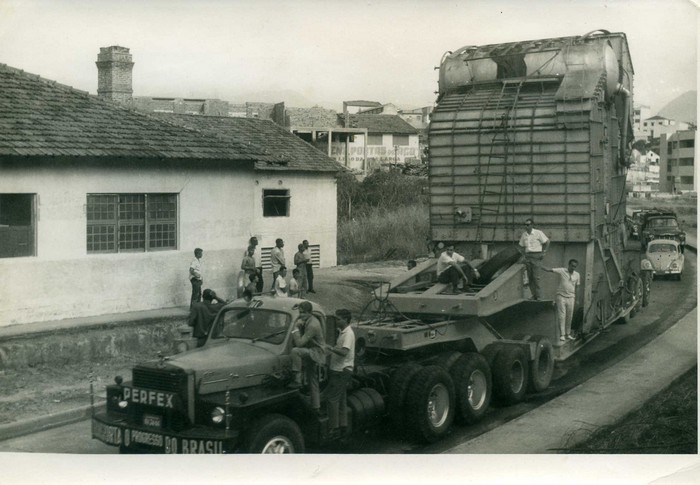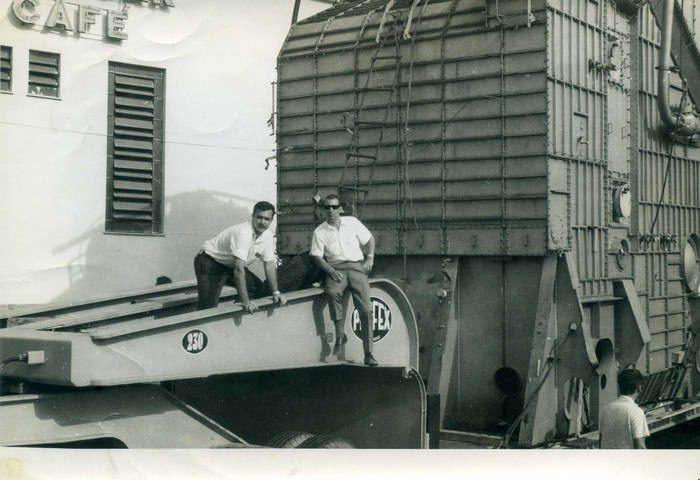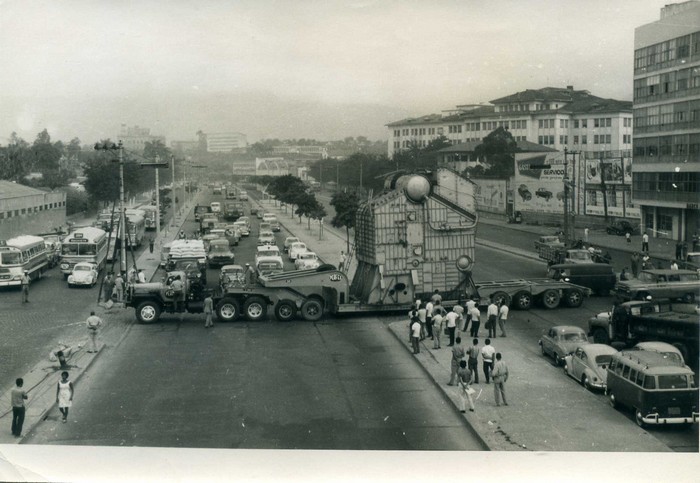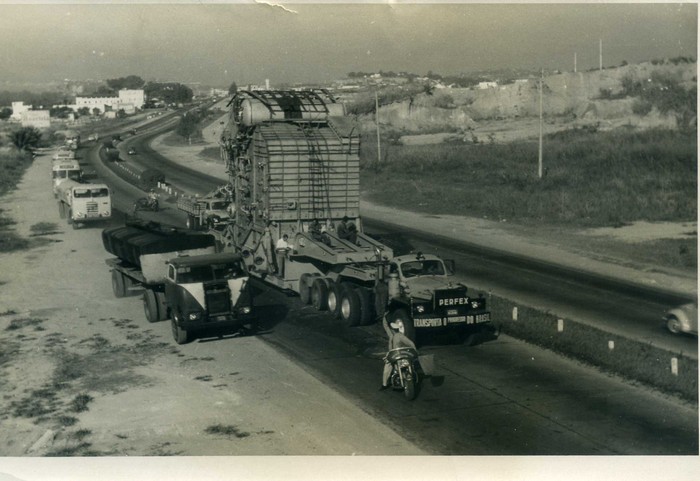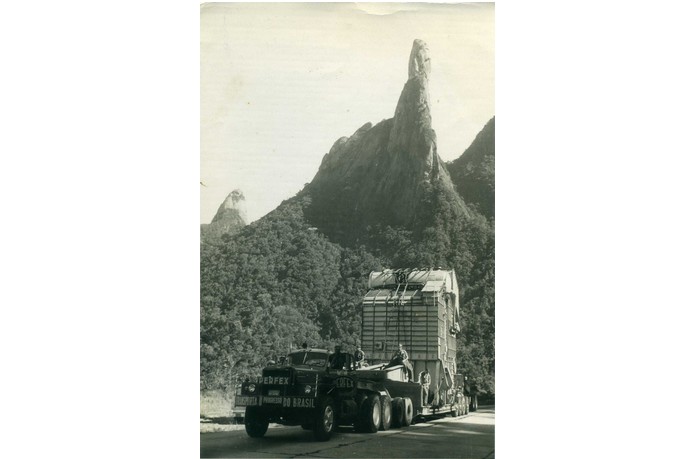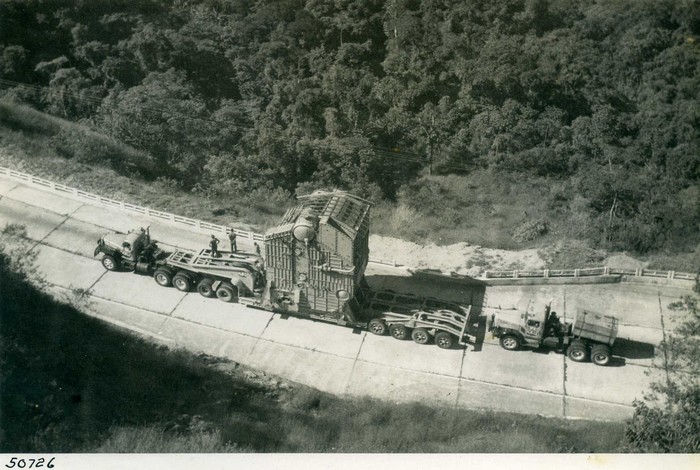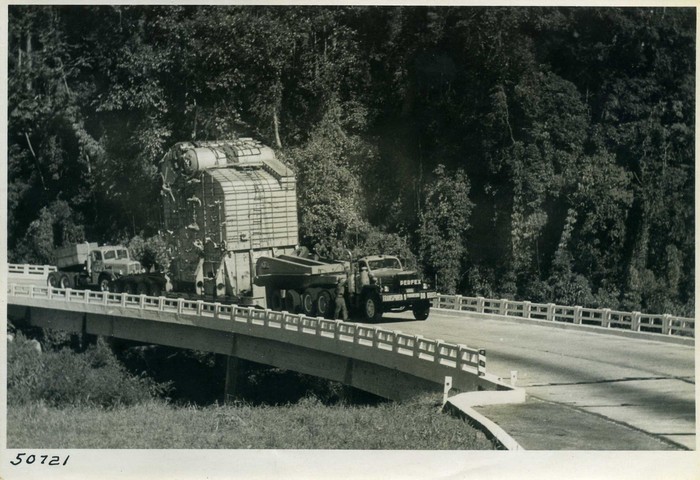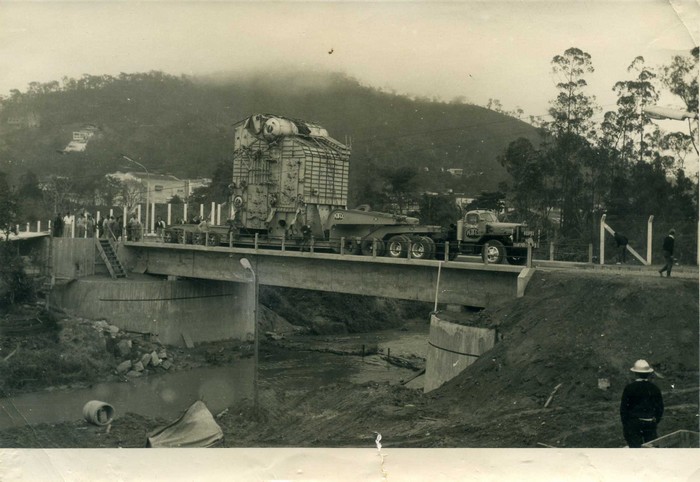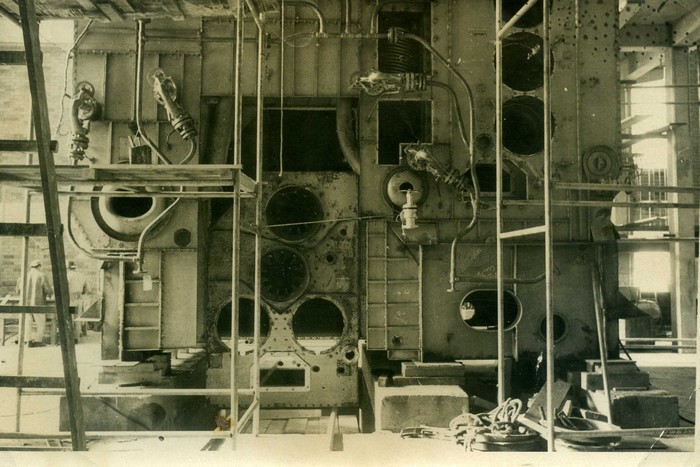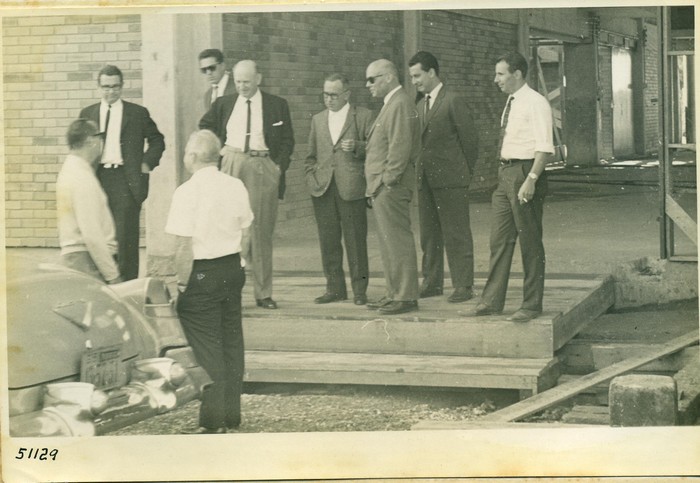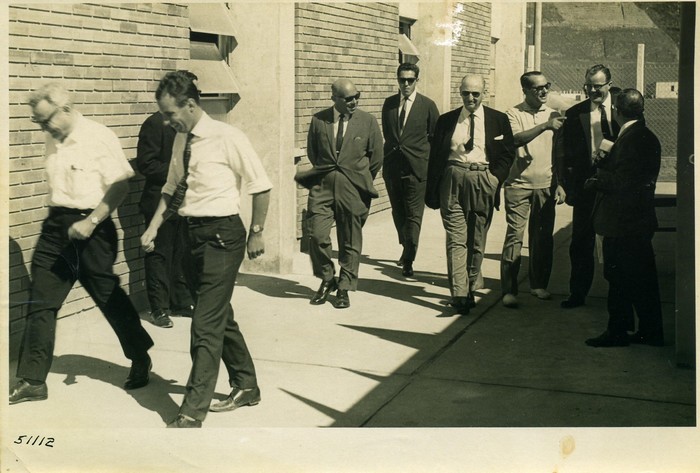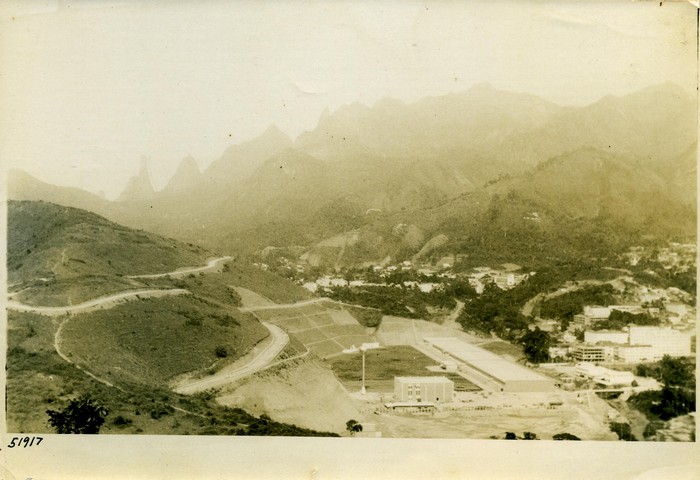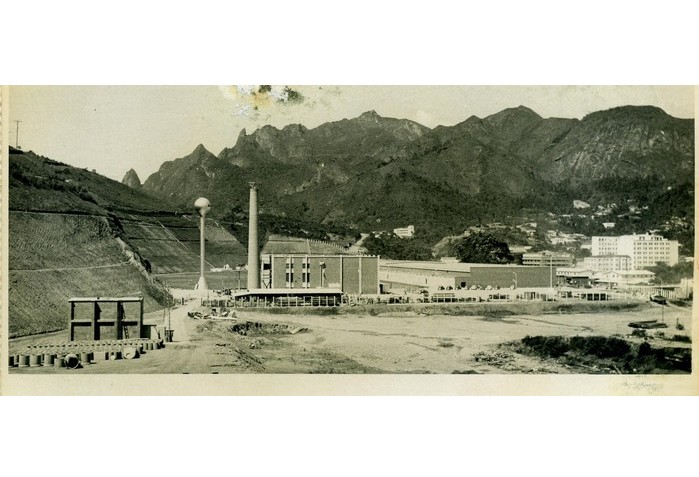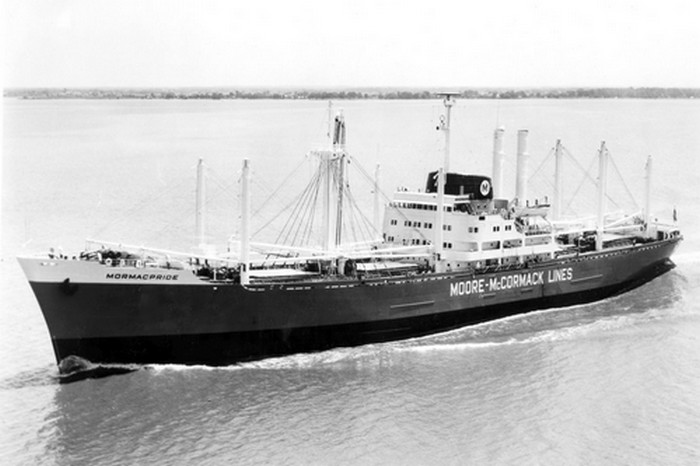Brazil
The Boiler
This was the fourth of identical boilers purchased from Boston Metals in Baltimore.
Two boilers were installed in our plant in Maracay, Venezuela; one in the plant in Colonia, Uruguay, then this one for the new factory in Teresopolis located in the mountains north of Rio de Janiero.
The first three were installed in 1962 and the Teresopolis boiler in 1966.
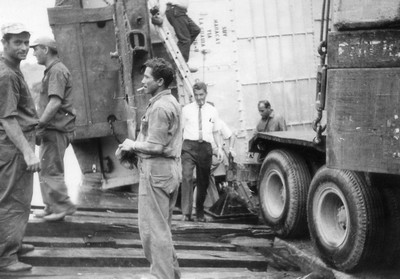 Boiler which tipped over in Los Teques.
Boiler which tipped over in Los Teques.
I was a trainee in Maracay when the two boilers were installed. On the way from the port in La Guaira through Caracas and out to Maracay, on the very curved road through Los Teques, the first boiler overturned on a curve, probably due to excess speed as the boiler weighed over 50 tons and the centre of gravity was high. It took a week to lift it up.
Later I was promoted to Power Plant Manager responsible for operating these two boilers.
When the Teresopolis boiler was purchased, I was given the task of making sure nothing happened to it on its journey from Baltimore to our plant in Teresopolis, one of the most interesting jobs I have ever done.
I started off in Baltimore at the dock alongside the S.S. Mormacpride, the ship that was going to take our boiler to Brazil. This was one of the most modern freighters of its day and travelled between New york and Argentina making stops along the way where necessary. As well as freight of any kind, it had cabins for about 6 passengers.
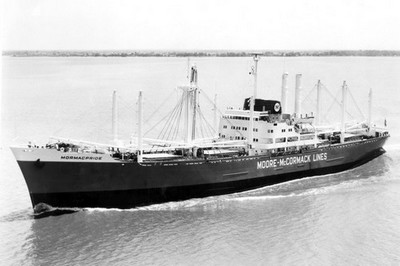 S.S.Mormacpride. See larger photo below.
S.S.Mormacpride. See larger photo below.
I was immediately taken on board by the First Officer whose job it was to load and unload the freight. The ship was equipped with its own crane (or derrick) capable of easily lifting the 50 ton boiler. We had coffee in a small. but comfortable lounge which normally the passengers would have used.
I had instructions to make sure that the boiler was put in the hold (our company was probably smuggling it into Brasil!). The boiler was lifted smoothly on to the deck, then left there. I was immediately concerned and told the First Officer that it had to go in the hold. He replied that the hold was full of coffee and they were on their way to New York to unload the coffee and so free the space in the hold for the boiler.
I was still concerned, but he told me that they would be travelling to New York through the inland water way that goes from New York to Miami and that he would certainly be putting the boiler lower down in the hold as it would be dangerous to travel in the ocean with such a load on deck. I was satisfied and said "see you in Rio"
A few days later, back at the plant in Venezuela, I got an urgent message that I had to be in New York the next day to be there when they transferred the boiler from the deck to the hold. My presence was completely unnecessary as I had seen that the ship's crane handled the boiler effortlessly and it was obvious that the ship would not sail into the Atlantic with such a heavy load on deck, but the order came from the company Vice President so I caught an evening plane to JFK and checked into a Holiday Inn by the airport. In the morning early a taxi to the port where I met up with Jack Guetta our New York office manager. He told me that George Murphy was at the office and when told that the boiler was to be moved and Chapman wasn't in New York he 'hit the roof'.
Anyway after coffee and biscuits again in the nice lounge onboard with the competent First Officer, Jack and I headed back on the subway to the office for me to confront George Murphy who was a very tough man.
He was in charge of the four South American plants and would visit Venezuela about every three months for a few days each time. In the early days of the company he was known to fire somebody on each visit so we used to make sure the plant was nice and tidy each time.
He had hired me in Manchester and seemed a straight talking man. I knew by instinct that I shouldn't argue with him.
I finally walked into his office and he immediately said "Tell me about it Mike". I explained the situation and that I was supremely confident in the ship and crew and that I felt there was no risk and my presence in New York was not needed. Then I played my trump. I admitted that he obviously had wanted me there and my mistake was that I should have consulted with my immediate engineering boss for this project, Eric Nielsen before making my decision and for that I was sorry.
The key phrase here was 'I made a mistake' as he was probably expecting me to justify myself and he would have to squash me, so with this I had disarmed him. After this he was as nice as pie and we talked about other things.
About 3 weeks after this, Jenny, Nick and I prepared our bags and flew to Brazil where we were expecting to spend about 6 months. We stayed in a hotel on Copacabana beach while I received the boiler at the port and then travelled daily up the main road to Teresopolis.
There was a drama on the day that the boat arrived in the Port of Rio. The low loader arrived and it seemed to me too small. The boiler was lowered on to it and the sides were overhanging the edge of the low-loader. As the centre of gravity of the 50 ton mass of the boiler was about 5 metres high even the slightest camber in the road would tip it over.
I was faced with a crisis as the factory staff who had dealt with the Transport company had signed contracts for that size of low-loader and they were trying to tell me that it would be OK. As my brief was that I was there to make sure that the boiler would arrive at its destination without mishap I decided to put my foot down in a meeting with the factory engineer and the Perfex transport manager. I explained what had happened in Venezuela and why I was there, then told them that if they insisted, I would contact George Murphy and tell him I was going back to Venezuela as I wasn't able to carry out my mission. I turned to the transport manager and asked if they had a bigger low-loader. He admitted sheepishly that they had, but it was in Sao Paolo and would take 3 days to get it to Rio. There were still objections as they would have to pay more and also the ship would be delayed a couple of days and we would have to pay them for this delay. I was still adamant and 3 days later we were able to transfer the boiler to the low-boy which thankfully was perfect for the job.
Now that I was firmly in charge, I dropped the next bombshell. We would not travel at more than 30 km/hr and that we would not work more than 8 hours a day so that the drivers would never be too tired. They had expected to get up to Teresopolis in the same day so again I had put the cost up! I told them that there was no rush and again explained the danger of over confidence. And so it was. We did it properly and in about 4 days the boiler arrived safely at the plant. The photos show the winding mountain road that climbs up into Teresopolis.
The most interesting thing for me in this tale was that I drank coffee on board the Mormacpride in Baltimore, New York and Rio de Janeiro.
We stayed in Teresopolis for about six months before returning to Maracay.
